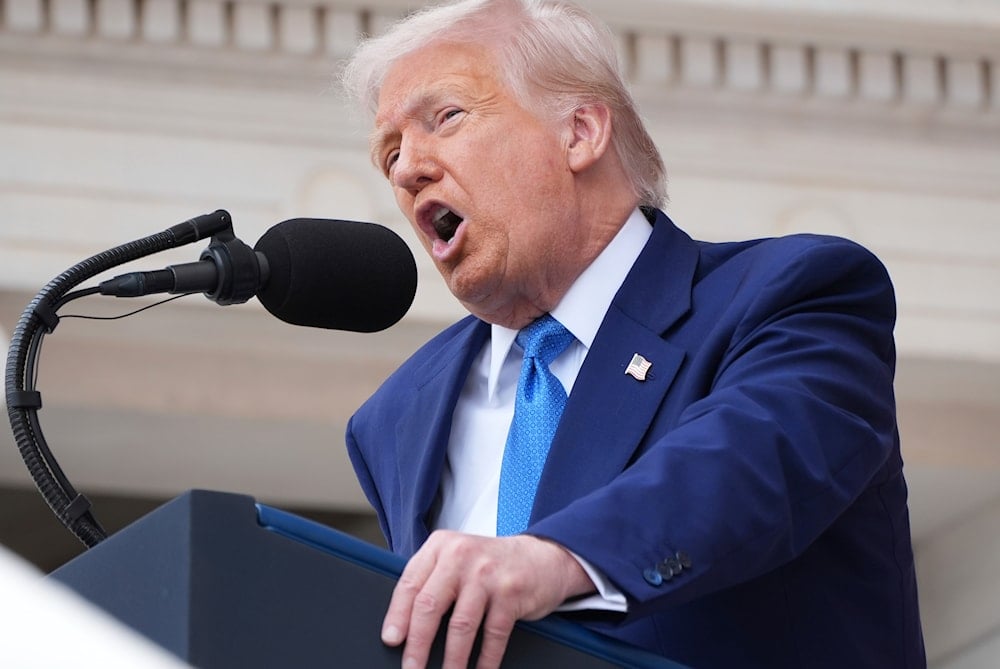Trump's 50% tariffs on steel, aluminum take effect
Trump cites national security and aims to boost US manufacturing as the reasons for the much-feared increase.
-

US President Donald Trump speaks during the 157th National Memorial Day Observance at Arlington National Cemetery, on Monday, May 26, 2025, in Arlington, Va. (AP)
The United States has officially enacted a sharp increase in import tariffs on steel and aluminum, with rates doubling to 50% following a directive signed by US President Donald Trump. The move, which took effect at 12:01 am on Wednesday, marks a significant escalation in Trump’s trade war strategy and is likely to deepen tensions with several key economic partners.
The tariff hike, announced last week during Trump’s visit to a United States Steel Corp plant in Pennsylvania, is aimed at shielding domestic metal industries from what the former president calls “unfair foreign competition.” Trump previously imposed a 25% tariff on steel and aluminum imports during his first term. The updated measure now raises that figure to 50%, showing his commitment to protectionist economic policies.
Framing the move as vital to national security and industrial resilience, Trump said the original tariffs had not done enough to help American producers. The presidential directive stated that the previous 25% rate “had not yet enabled” domestic steel and aluminum sectors "to develop and maintain the rates of capacity production utilisation that are necessary for the industries’ sustained health and for projected national defence needs.”
The White House posted the full order on X, emphasizing that higher import duties would “reduce or eliminate the national security threat posed by imports of steel and aluminium articles and their derivative articles.” The announcement follows a renewed push by Trump to center his 2024 campaign rhetoric on economic nationalism and industrial protection.
White House cites national security for tariff hike
As part of the measure, imports from the United Kingdom are temporarily exempt from the 50% rate, remaining at 25% until at least July 9. That exemption, according to the directive, is intended to give both countries time to finalize a quota or tariff-based arrangement. Despite ongoing negotiations, no agreement has yet been reached on long-term trade terms between Washington and London.
Trump’s comments in Pennsylvania reinforced the framing of the tariffs as a matter of strategic self-reliance. “That means that nobody’s going to be able to steal your industry,” he told a crowd of steelworkers. “It’s at 25 per cent, they can sort of get over that fence; at 50 per cent they can no longer get over the fence.”
Tariff escalation fuels broader trade tensions
The implementation of the 50% tariffs is already causing friction with multiple trading partners. The administration is currently in talks with several governments over Trump’s so-called “reciprocal” trade duties, with a July 9 deadline looming for potential deals. The decision also adds a new layer of complexity to ongoing global negotiations, especially as trade relationships shift amid heightened geopolitical competition.
President Trump just signed a proclamation raising tariffs on steel and aluminum imports by 50% to protect U.S. steel and national security.🇺🇸
— The White House (@WhiteHouse) June 3, 2025
THE GOLDEN AGE IS HERE! pic.twitter.com/TP32u0M4dR
Trump confirmed that the aluminum tariff would also rise to 50%, aligning it with the steel rate. The combined levies are expected to raise costs for foreign producers and strain supply chains, while potentially boosting revenue and output for US-based manufacturers.
Legal uncertainty surrounds Trump’s tariff powers
While the former president’s authority to impose unilateral tariffs has been under legal scrutiny, the new steel and aluminum measures stand on firmer ground. A federal court recently struck down several of Trump’s previous duties imposed under the International Emergency Economic Powers Act. However, the current tariffs were implemented under a different authority related to national security and are not affected by that ruling.
Trump has repeatedly said he will not be deterred by legal challenges. “We’re going to keep fighting for American steel,” he told supporters, reiterating his pledge to bring more industrial jobs back to the US.

 4 Min Read
4 Min Read










